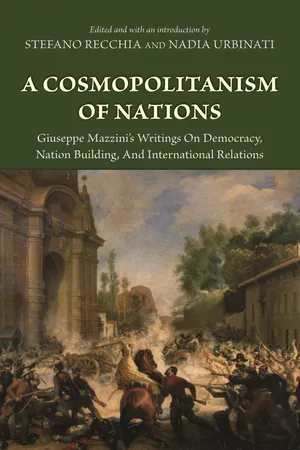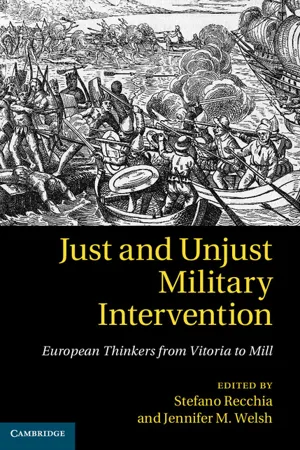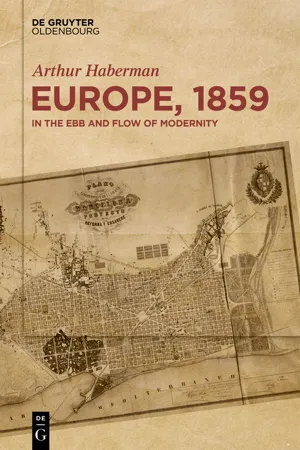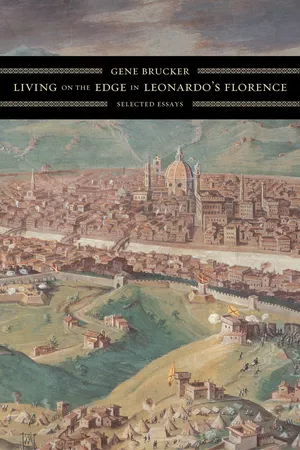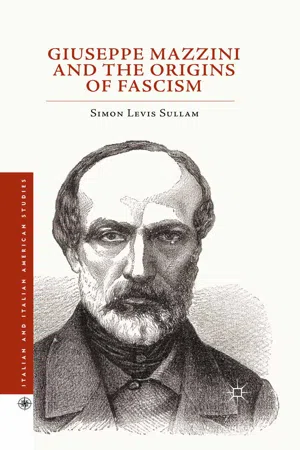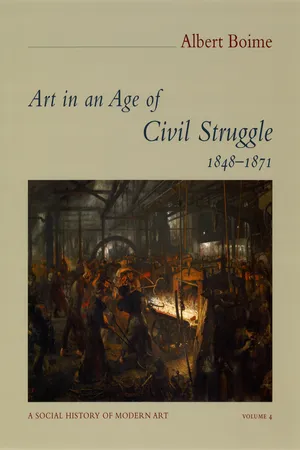History
Giuseppe Mazzini
Giuseppe Mazzini was an Italian politician, journalist, and activist who played a key role in the Italian unification movement during the 19th century. He was a fervent advocate for the establishment of a unified Italian republic and was instrumental in inspiring and organizing nationalist movements across Italy. Mazzini's efforts significantly contributed to the eventual unification of Italy.
Written by Perlego with AI-assistance
Related key terms
1 of 5
6 Key excerpts on "Giuseppe Mazzini"
- eBook - PDF
A Cosmopolitanism of Nations
Giuseppe Mazzini's Writings on Democracy, Nation Building, and International Relations
- Giuseppe Mazzini, Stefano Recchia, Nadia Urbinati, Stefano Recchia, Nadia Urbinati(Authors)
- 2009(Publication Date)
- Princeton University Press(Publisher)
INTRODUCTION Giuseppe Mazzini’s International Political Thought Giuseppe Mazzini (1805–72) is today largely remembered as the chief inspirer and leading political agitator of the Italian Risorgimento. Yet Mazzini was not merely an Italian patriot, and his influence reached far beyond his native country and his century. In his time, he ranked among the leading European intellectual figures, competing for public atten-tion with Mikhail Bakunin and Karl Marx, John Stuart Mill and Alexis de Tocqueville. According to his friend Alexander Herzen, the Russian political activist and writer, Mazzini was the “shining star” of the dem-ocratic revolutions of 1848. In those days Mazzini’s reputation soared so high that even the revolution’s ensuing defeat left most of his Euro-pean followers with a virtually unshakeable belief in the eventual tri-umph of their cause. 1 Mazzini was an original, if not very systematic, political thinker. He put forward principled arguments in support of various progressive causes, from universal suffrage and social justice to women’s enfran-chisement. Perhaps most fundamentally, he argued for a reshaping of the European political order on the basis of two seminal principles: de-mocracy and national self-determination . These claims were extremely radical in his time, when most of continental Europe was still under the rule of hereditary kingships and multinational empires such as the Habs-burgs and the Ottomans. Mazzini worked primarily on people’s minds and opinions, in the belief that radical political change first requires cultural and ideological transformations on which to take root. He was one of the first political agitators and public intellectuals in the contemporary sense of the term: not a solitary thinker or soldier but rather a political leader who sought popular support and participa-tion. - eBook - PDF
Just and Unjust Military Intervention
European Thinkers from Vitoria to Mill
- Stefano Recchia, Jennifer M. Welsh(Authors)
- 2013(Publication Date)
- Cambridge University Press(Publisher)
As early as 1831, working undercover in France, Mazzini founded the revolutionary organization Giovine Italia (Young Italy), aimed at promoting the patriotic ideal among Italy’s educated middle classes and coordinating national insurrections. In subsequent years he attempted, not always successfully, to set up similar patriotic organiza- tions for Germany, Greece, Spain, Russia and Poland. In 1834, while in Switzerland, he founded a new transnational revolutionary association, ambitiously called Young Europe, with a dozen refugees from Italy, Poland and Germany. From 1837 onwards, he spent most of his time in London, where he continued to write and publish assiduously. He also attempted to coordinate what he saw as an emergent pan-European struggle against the imperial dominion of the Habsburgs, Romanovs, and Ottomans over Italy, Central Europe, and the Balkans. 6 By the mid-nineteenth century, Mazzini ranked among the most influential European political thinkers, along with intellectual heavy- weights such as Karl Marx, John Stuart Mill, Mikhail Bakunin and Alexis de Tocqueville. The Italian revolutionary’s political career reached its zenith quite abruptly in the spring of 1849. A popular uprising in Rome against the despotic rule of Pope Pius IX abolished the temporal power of the papacy, and a constituent assembly proclaimed the revolutionary Roman Republic. Mazzini, called back to Italy, was elected as a member of the republic’s “triumvirate,” or three-person governing council – but his popularity in revolutionary circles preordained him to become the 6 D. Mack Smith, Mazzini (New Haven, CT: Yale University Press, 1994), pp. 5ff. For a detailed history of Young Italy and Young Europe, see F. Della Peruta, Mazzini e i rivoluzionari italiani: Il partito d’azione 1830–1845 (Milan: Feltrinelli, 1974), chs. 2–3. The origins of liberal Wilsonianism 239 - eBook - ePub
Europe, 1859
In the Ebb and Flow of Modernity
- Arthur Haberman(Author)
- 2022(Publication Date)
- De Gruyter Oldenbourg(Publisher)
31Metternich and others regarded Mazzini at this time as the most important revolutionary in all of Europe. He re-launched Young Italy in 1839 and was involved in a number of schemes opposing outside authority on the Italian peninsula.Mazzini’s most prominent involvement came as a result of the uprisings of 1848. In Rome, Pope Pius IX fled the city, and in 1849 Mazzini led the short-lived Roman Republic in a government that was regarded as capable and efficient. The French helped to restore Pius IX to his throne and the pope, thought to have liberal tendencies when he was elevated to the papacy in 1846, became the Roman pontiff most opposed to all of modernity until his death in 1878 ended the longest reign in papal history.Mazzini’s reputation was only furthered by his efforts in 1848 – 49, but again he went into exile and organized a series of conspiracies in favour of Italian independence from abroad. He was the touchstone for many conspirators and actors, and it is agreed that his contribution to Italian unity and independence was necessary for it to happen.Necessary, but not sufficient. In 1858 and 1859 Cavour in Piedmont and Garibaldi from the south began the wars that would lead to an Italy united in 1870. Mazzini realized his dream, though others played parts that an exile could not perform.Mazzini wrote a great deal, but he was not a systematic thinker who would develop a fully coherent philosophy in the manner of many nineteenth century thinkers, including Mill, Marx, and Darwin in the England in which all four resided. Mazzini’s writings hark back to the Romantic era and are in the tradition of the idealist position out of which early nationalist philosophy developed.As well, his work sometimes looks forward. His appeal is often emotional, presaging the twentieth century when politics began to be seen as far different from a simple rational calculation of what is in one’s best interest. The nationalism he espoused cut quickly to matters of identity, community, desire, and emotion. - eBook - PDF
Living on the Edge in Leonardo’s Florence
Selected Essays
- Gene Brucker(Author)
- 2005(Publication Date)
- University of California Press(Publisher)
pulse, could not be expunged from the minds and hearts of a growing number of Italians. These patriots joined secret societies dedicated to the goal of a free and united Italy; some participated in conspiracies and uprisings that broke out sporadically in Naples and Sicily in 1820, in Piedmont in 1821, in central Italy in 1831, in Genoa in 1834. These re- bellions were fueled not only by the ideology of the French Revolution, but also by deteriorating economic and social conditions, a consequence of transformations in the European economy. But none of these rebel- lions were able to attract widespread support beyond their place of ori- gin, or in large segments of the society. They were suppressed by the military and police forces of the Austrian government and the satellite regimes. Among the welter of programs formulated in these post-Napoleonic years to achieve national unity, two basic patterns can be identified. Giuseppe Mazzini was the primary architect of the more radical plan for unification. He believed that Italians must achieve their independence through their own efforts, without any foreign assistance. They could not rely upon French support and guidance; they had to liberate them- selves. Freedom and unification were to be won through revolutionary activity, by means of organized uprisings that would spread through the length and breadth of the peninsula. To implement his program, Maz- zini forged a network of clandestine supporters in major Italian cities, encouraging them to prepare for the moment when the old order would collapse in the struggle for national liberation. He was a staunch repub- lican, but unlike many of his colleagues, he did develop a social agenda. For Mazzini, political goals were paramount, and he deplored class con- flict as impeding the movement toward a free and independent Italy. The revolution that he envisaged was to be organized and led by a cadre of young, idealistic patriots recruited from the elite. - eBook - PDF
- Simon Levis Sullam(Author)
- 2015(Publication Date)
- Palgrave Macmillan(Publisher)
1 Giuseppe Mazzini and the Religion of the Nation Translated by Sergio Knipe The Duties of Rising Italy “ I intend to speak to you of your duties. I intend to speak to you, according to the dictates of my heart, of the holiest things we know: to speak to you of God, of Humanity, of the Country, of the Family.” On April 23, 1860, only a few weeks before Garibaldi’s ships set sail from Quarto for the Expedition of the Thousand, and only 11 months before the first government of unified Italy was established, Mazzini was dedicating and ideally entrusting “to the Italian working men” and to Italy his upcoming book The Duties of Man. 1 This text, Mazzini’s most famous work, 2 brings together some central and recurrent themes in his thought. The original core of the book was already to be found in some articles Mazzini had published in Apostolato popolare in London in the years 1841–42. In 1851 these articles were issued in Genoa as On the Duties of Man, the title by which they were committed to posterity one decade later in their final expanded version. 3 At the center of the work lies the concept of “Duty”: not just the most crucial of Mazzini’s fundamental ideas but also—as some interpreters have argued— “the greatest claim to originality of [his] political philosophy,” which thus set s “duties above rights.” 4 This concept had reached full development in Mazzini’s thought by the early 1840s; yet it had first been foreshadowed, a few years earlier, in his 1835 essay Faith and the Future. 5 Already in this text one could read that “right is 12 Giuseppe Mazzini AND THE ORIGINS OF FASCISM the faith of the individual. Duty is the common collective faith. Right can but organize resistance; it may destroy, it cannot found. - eBook - PDF
- Albert Boime(Author)
- 2008(Publication Date)
- University of Chicago Press(Publisher)
The writings of their key spokesperson and apologist, Telemaco Signorini, supported by a host of eyewitness testimony, confirm their origins in radical Tuscan politics. 7 5 . 1 Rafaello Sernesi, Roofs in the Sunlight , ca. 1860 – 1861 . Galleria nazionale d’arte moderna, Rome. 5 . 2 Vito D’Ancona, Portico , ca. 1861 . Galleria d’arte moderna, Palazzo Pitti, Florence. 369 the macchia and the risorgimento The Architects of Italian Unity Giuseppe Mazzini Destined to become the most influential radical of the Risorgimento, the charismatic Giuseppe Mazzini began his career as a member of a Carbon-aro society and later formed his own network known as La Giovine Italia (Young Italy). The aims of Giovine Italia were to indoctrinate a new gen-eration of Italians in the concept of a united and independent Italy with its capital at Rome and to foster a republican form of government. Com-mitted to the necessity of popular insurrection, Mazzini expended much of his energy editing subversive newspapers, smuggling them across Italian borders, and fomenting uprisings in key regions. As a result, he was forced to live in exile most of his life, settling more or less permanently in Lon-don. It may be recalled from the previous chapter that he was friendly with Rossetti’s father, and often attended meetings at their home. He also at-tracted such prominent followers as Thomas Carlyle and Algernon Charles Swinburne. Mazzini made a brief appearance in Italy during the Italian insurrections of 1848 , and enjoyed his finest hour when, in March 1849 , he was elected a member of the triumvirate of the new Roman Republic fol-lowing the flight of the pope. When the French attacked Rome, Mazzini organized a heroic resistance in which Garibaldi played a major role. After Rome fell in June, Mazzini once again escaped to London.
Index pages curate the most relevant extracts from our library of academic textbooks. They’ve been created using an in-house natural language model (NLM), each adding context and meaning to key research topics.
